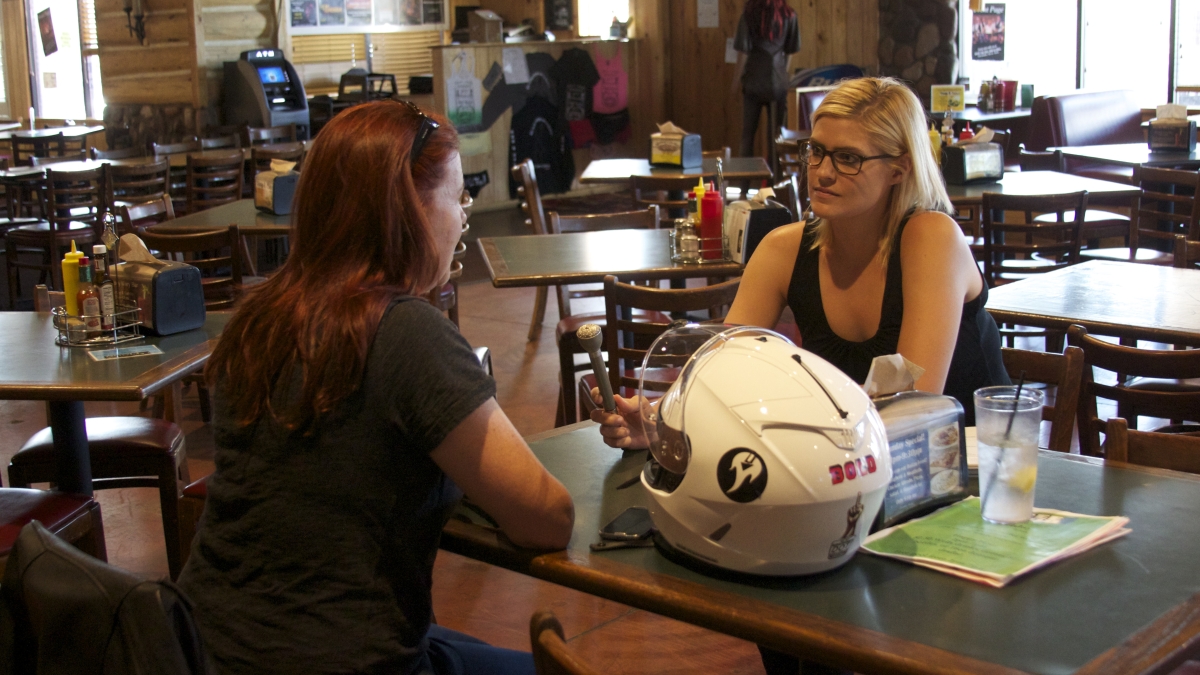Cronkite PIN Bureau wins APME College Innovator of the Year Award

Cronkite School alumna Margaret Staniforth (right) interviews a motorcyclist at What the Hell Bar and Grill in Mesa, Arizona, for the PIN Bureau on July 19, 2015. Photo by Lex Talamo/Cronkite School
A cutting-edge journalism program at Arizona State University’s Walter Cronkite School of Journalism and Mass Communication has received a prestigious innovation award from a leading association of some of the nation’s top journalists.
The Cronkite School’s Public Insight Network Bureau, a professional program designed to help news organizations strengthen community engagement, has won the Innovator of the Year Award for College Students from the Associated Press Media Editors.
“The PIN Bureau has been at the forefront of teaching and discovering ways to engage with news consumers,” said Christopher Callahan, dean of the Cronkite School. “We’re very pleased that this award recognizes those efforts.”
Supported by the John S. and James L. Knight Foundation, the Corporation for Public Broadcasting and American Public Media, the PIN Bureau offers an immersive learning experience in which students work with professional journalists across the country. Students use APM’s Public Insight Network, a database of more than 225,000 news sources, to connect journalists with diverse audiences to produce coverage that is more personal, relevant and inclusive.
APME judge Gary Graham, editor of the Spokesman-Review in Spokane, Washington, in his remarks said, “The students paired shoe-leather reporting skills and street-smart use of new media tools to tell the untold stories of Phoenix communities. The program helps students develop critical listening skills and ways to engage ordinary people in extraordinary ways.”
Launched in 2014 under the direction of Cronkite Professor of Practice Rebecca Blatt, the PIN Bureau has worked with news organizations across the country, including the Center for Public Integrity, CNBC, the Charlotte (N.C.) Observer and Univision Arizona. Students also work with Cronkite’s own news organization — Cronkite News, the news division of Arizona PBS.
In addition, PIN Bureau students each select a local community that is underrepresented in news coverage, and they immerse themselves in those communities throughout the course. Students spend time with members of the community, talking in person, via social media and through PIN, and ultimately produce a multimedia project based on what they learn.
“This award highlights how critical community engagement is for the future of the news industry,” said Blatt. “Newsrooms across the country are looking to Cronkite students to drive innovation in engagement and reporting.”
Students who have completed the PIN Bureau said they’ve learned to listen to people and build relationships with sources and audiences. In an end-of-the-semester reflection on his experience, Cronkite student Chris Caraveo wrote, “To be a better reporter of the community, you have to be a part of the community in an observant capacity. Listen, listen, listen!”
Last year, the PIN Bureau won ASU’s President’s Award for Innovation, an honor that recognizes significant contributions to the university through the development of cutting-edge projects and programs.
The PIN Bureau is one of a dozen immersion programs in which students receive real-world experience under the guidance of award-winning journalists and communications experts. The others include a nightly television news broadcast that airs on Arizona PBS, digital news bureaus in Washington and Phoenix, sports bureaus in Los Angeles and Phoenix, a strategic public relations agency, an entrepreneurial digital innovation lab, a business reporting bureau, a borderlands reporting bureau and a newsgathering and a digital production and design bureau.
APME is an association of editors and content leaders at newspapers, broadcast outlets and digital newsrooms as well as journalism educators and student leaders in the U.S. and Canada. The association closely works with the Associated Press to foster journalism excellence by promoting forward-looking ideas that benefit news organizations and the communities they serve.
The Public Insight Network Bureau
Cronkite School faculty
Rebecca Blatt, director, Cronkite News Digital Production Bureau, professor of practice, former PIN Bureau chief
Theresa Poulson, PIN Bureau chief
Kristin Gilger, associate dean
Cronkite students
Gabrielle Abbott
Stacia Affelt
Sandra Balazic
Jasmine Barta
Christopher Caraveo
Claire Caulfield
Hannah Cissell
Alexandria Coleman
Colette Gordon
Kelsey Linn
Maria Lopez
Alexis Macklin
Jolanie Martinez
Alana Ray Osborne
Lindsay Robinson
Samantha Shotzbarger
Margaret Staniforth
Tamsyn Stonebarger
Miranda VanHorn
Keerthi Vedantam
Alexandra Watts
Sara Weber
American Public Media partners
Linda Miller, director, network journalism and innovation, PIN/APM
More Law, journalism and politics

Native Vote works to ensure the right to vote for Arizona's Native Americans
The Navajo Nation is in a remote area of northeastern Arizona, far away from the hustle of urban life. The 27,400-acre…

New report documents Latinos’ critical roles in AI
According to a new report that traces the important role Latinos are playing in the growth of artificial intelligence technology…

ASU's Carnegie-Knight News21 project examines the state of American democracy
In the latest project of Carnegie-Knight News21, a national reporting initiative and fellowship headquartered at Arizona State…